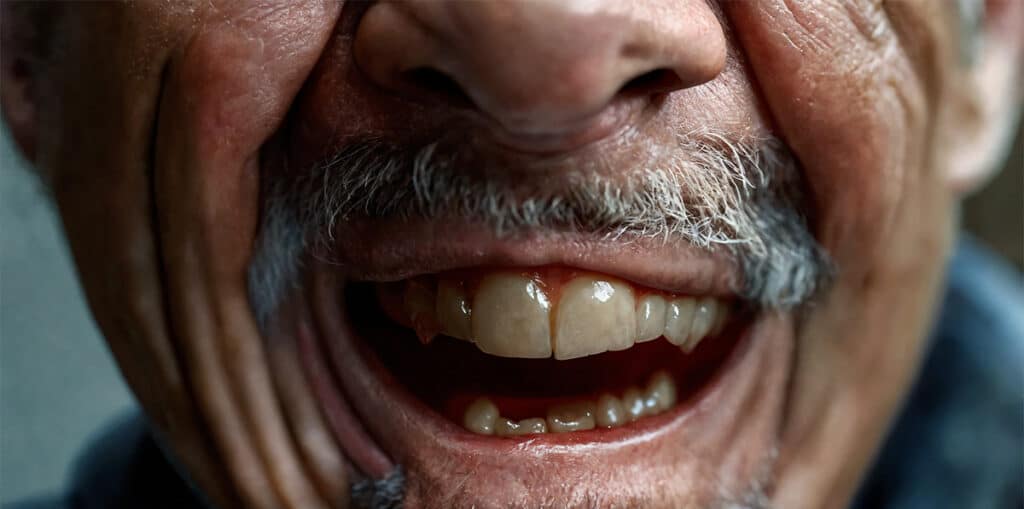In the bustling rhythm of modern life, seniors find themselves facing unique challenges when it comes to maintaining their health and wellness. This is especially true for those adapting to life with dentures. Managing denture care amidst a packed schedule can seem daunting, but it’s crucial for both oral health and overall well-being. The essence of this guide is to navigate the complexities of denture care for the busy senior, ensuring that even on the go, your smile remains as vibrant and healthy as ever.
The Importance of Proper Denture Care
At the heart of a fulfilling life with dentures lies the commitment to proper care and maintenance. Neglecting denture care can lead to a host of dental issues, including gum disease, infections, and even changes in facial structure. Interestingly, the American Dental Association highlights that over 36 million Americans use dentures, emphasizing the need for dedicated care routines.
The cornerstone of denture maintenance is not just about cleanliness; it’s about preserving your health, comfort, and confidence. Studies have shown that well-maintained dentures can significantly enhance the quality of life, especially in seniors, by improving nutrition intake, speech, and self-esteem.
Seamless Denture Care Strategies
Navigating denture care amidst a bustling lifestyle may seem daunting, but implementing a set of straightforward and effective strategies can transform this challenge into a seamless aspect of your daily routine. The aim is to ensure that denture maintenance becomes an integrated, hassle-free component of your day, empowering you with confidence and comfort without sacrificing precious time.
Effortless Cleaning Routines
The foundation of denture care lies in cleanliness. A simple yet comprehensive cleaning regimen can prevent the buildup of bacteria and ensure your dentures remain in pristine condition. Start by rinsing your dentures after each meal; this quick step efficiently removes food particles and prevents staining. For daily cleaning, opt for a soft-bristle brush specifically designed for dentures, paired with a mild, non-abrasive cleaner to avoid scratching the surface. An often-overlooked step is the nightly soak in a specialized denture-cleaning solution. This not only deep cleans but also helps in maintaining the denture’s shape, ensuring they fit comfortably and securely in your mouth.
The Significance of a Perfect Fit
Comfort and oral health are inextricably linked to the fit of your dentures. Ill-fitting dentures are more than just a nuisance; they can lead to serious health issues such as sores, infections, and even bone loss. This underscores the importance of regular dental check-ups. Professionals can make necessary adjustments to ensure a perfect fit and prevent potential complications. The University of Michigan School of Dentistry underscores the necessity of these visits, recommending that denture wearers schedule adjustments and screenings for oral diseases at least once a year.
Nutritional Considerations for Denture Wearers
The role of nutrition in denture care cannot be overstated. A balanced diet rich in fruits, vegetables, and lean proteins does more than just support overall health; it also plays a crucial role in maintaining denture integrity. Certain foods, especially those that are hard, sticky, or excessively chewy, can damage dentures or even dislodge them. By opting for denture-friendly foods, you not only ensure the longevity of your dentures but also safeguard your nutritional intake, striking a balance that supports both your oral health and your dentures.
Guidelines for Managing Dentures While Traveling
When embarking on travels, the dynamics of denture care inevitably shift, necessitating a tailored approach to ensure your oral health doesn’t take a backseat during your adventures. The transition can be smooth and stress-free with the right preparation and mindset. Here’s how to maintain impeccable denture care, even when you’re miles away from the comfort of your home.
Crafting Your Travel Denture Care Kit
A crucial ally in your journey is a well-assembled denture care kit, compact yet comprehensive. This kit should include a denture brush, formulated for the unique needs of dentures to ensure thorough cleaning without causing damage. A non-abrasive cleaning solution is essential for daily cleaning, while a container for soaking will keep your dentures safe and allow for overnight cleaning, crucial for maintaining hygiene and denture integrity. Equipping yourself with these tools ensures that your denture care routine remains uninterrupted, no matter where your travels take you.
The Mastery of Subtle Denture Maintenance
Travel often demands flexibility and discretion in denture maintenance, especially in shared spaces or during public engagements. Cultivating the skill of discreet denture care—utilizing moments of privacy in restrooms or secluded areas for quick rinses or adjustments—keeps your dentures in optimal condition throughout your journey. This not only ensures your comfort but also maintains the aesthetics of your dentures, allowing you to engage confidently in all your activities.
Hydration: The Unsung Hero of Oral Health
For denture wearers, the importance of staying hydrated cannot be overstated. Regular water intake is pivotal in preventing dry mouth, a common challenge that can exacerbate discomfort and increase the risk of bacterial growth under dentures. Ensuring you drink enough water not only promotes general health but also supports the specific needs of denture wearers, enhancing comfort and oral hygiene as you explore new horizons.
Preparedness for the Unexpected
Despite the best-laid plans, emergencies can arise. Being prepared means having a clear plan for dealing with unforeseen dental issues. Familiarize yourself with the locations of dental clinics in your travel destination and consider carrying a spare set of dentures, if feasible. This level of preparedness provides peace of mind, allowing you to fully immerse in your travels, secure in the knowledge that you can handle dental emergencies should they occur.
| Aspect | Recommendation | Benefit |
|---|---|---|
| Cleaning Frequency | Daily | Prevents plaque build-up and odor |
| Nighttime Care | Remove dentures overnight | Allows gums to rest and prevents infections |
| Check-up Frequency | Annually or as recommended | Ensures proper fit and health of oral tissues |
| Dietary Adjustments | Soft, nutritious foods | Reduces wear and tear on dentures |
| Hydration | Drink plenty of water | Prevents dry mouth and enhances comfort |

The Importance of Nighttime Care
Nighttime care for denture wearers transcends mere routine—it is an essential practice that plays a pivotal role in maintaining oral health and comfort. The act of removing dentures before sleep does more than just mark the end of the day; it initiates a critical recovery period for your gums.
A Restorative Pause for Your Gums
Every day, your gums endure the constant pressure and friction from dentures, no matter how well-fitted they might be. This daily exertion can lead to soreness and even contribute to more significant oral health issues if not addressed. By removing your dentures at night, you grant your gums a necessary respite. This pause in wear allows your gums to breathe, recover, and heal from any irritation or pressure experienced during the day.
The benefits of this nightly routine extend beyond mere physical relief. It’s a preventative measure against infections, such as denture stomatitis, a condition often resulting from constant denture wear without adequate breaks. This time without dentures not only allows your gums to rest but also reduces the risk of developing fungal infections, promoting a healthier oral environment.
Embracing Nighttime Care
Incorporating denture removal into your nighttime routine might require some adjustment, especially for new denture wearers. However, the long-term benefits for your oral health and comfort are undeniable. This practice ensures that your gums have the opportunity to recover, setting a foundation for a healthier relationship with your dentures.
Nighttime care is a testament to the importance of balance in denture wear—balancing the benefits of wearing dentures with the need for oral tissues to rest and rejuvenate. It underscores the principle that effective denture care is not just about the times you wear them, but equally about the times you do not, fostering an environment where your oral health can thrive.
Denture Care for the Busy Senior on the Go: Your FAQs Answered
How often should I clean my dentures?
Clean your dentures daily to remove food particles and prevent plaque buildup, which can lead to odor and staining.
Is it necessary to remove my dentures at night?
Yes, removing your dentures at night allows your gums to rest and helps prevent infections and irritation from continuous wear.
What should I do if my dentures feel uncomfortable?
If your dentures feel uncomfortable or loose, consult your dentist. They may need to be adjusted for a better fit.
Can I use regular toothpaste to clean my dentures?
No, regular toothpaste can be too abrasive for dentures. Use a soft-bristled brush and a cleaner specifically designed for dentures.
How do I handle dentures while traveling?
Pack a travel-sized denture care kit, including a brush, cleaner, and container for soaking. Also, consider carrying a spare set if possible.
What foods should I avoid with dentures?
Avoid hard, sticky, or chewy foods that can damage your dentures or dislodge them. Opt for softer, nutritious foods that are easier to chew.
How can I prevent my dentures from staining?
Avoid consuming beverages that stain, like coffee, tea, and red wine, and rinse your dentures after eating foods that may lead to staining.
What should I do in case of a denture emergency?
Keep the contact information of a dental professional who can assist during emergencies, especially when traveling.
How does drinking water benefit denture wearers?
Staying hydrated prevents dry mouth, enhances comfort, and helps maintain a healthy environment for your gums.
Are dental check-ups still necessary if I have full dentures?
Yes, regular check-ups are important for ensuring the health of your gums and the fit of your dentures, as well as screening for oral diseases.
Citation
- “Management of the Edentulous Patient“. Clinical Evidence Handbook, published by the BMJ. Offers evidence-based guidelines for the management of patients with complete edentulism, including considerations for nutritional adjustments and denture care.
- “Impact of Edentulousness on Food and Nutrient Intake“. Journal of Prosthetic Dentistry. Details how losing teeth and using dentures affect the types and amounts of food consumed, potentially impacting nutritional intake and health.
- “Denture Hygiene: A Review and Update“. Journal of Contemporary Dental Practice. Reviews current practices and recommendations for denture hygiene, underlining the connection between hygiene practices and oral as well as general health in denture wearers.







